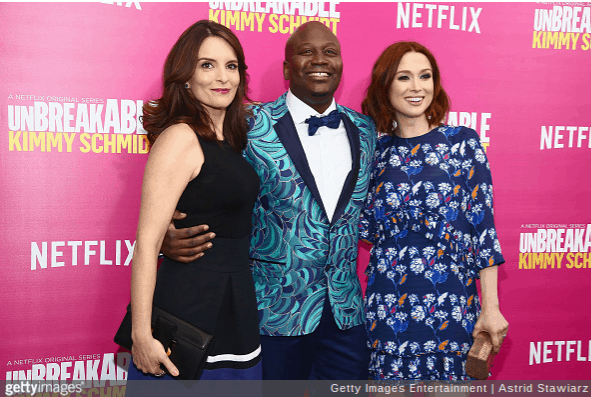I’m in love with a mole woman. That is, I really love the Netflix series Unbreakable Kimmy Schmidt.
In case you have been living under a rock — or in a bunker — this Tina Fey-created sitcom follows a young woman after she and three other “mole women” were rescued from a doomsday cult. They had been trapped in a bunker in Indiana for fifteen years, and now Kimmy is trying to restart her life in New York City.
Ridiculous premise? Yes. But it works. Hilariously. Binging on season two started April 15.
There are many reasons to sing this show’s praises: brilliant writing with an incredible number of laughs per minute, the perfectly-cast Ellie Kemper1 in the title role, the fact that three of the four main characters are women — and the fourth is a gay black man who is one of the most hilarious characters…ever. There is also cutting social commentary that lies just below the surface of this lighthearted thirty-somethings-in-Brooklyn tale.
Perhaps, however, the biggest reason I love this show is that I spent my childhood in 1990s America. Born in 1985, the vast majority of my childhood memories are from that glorious decade of Saved by the Bell, N64, and neon windbreakers. And, one of the show’s frequent sources of hilarity is Kimmy’s references from the ‘90s in a contemporary world where everyone else was not living in a bunker.2 Watching Kimmy Schmidt is a constant blast from the past.
***
At the same time that Kimmy Schmidt has experienced success despite being narrowly aimed at U.S. millennials, Netflix has undergone a rapid global expansion, developing content aimed at audiences around the world. Netflix is now accessible almost anywhere outside of North Korea.3 In January, they added 130 countries. Overnight. Much of the original Netflix content looks less like Schmidt — whose jokes and references are impossible to translate4 — and much more like Daredevil, a superhero crime drama.
Brian Barrett at Wired penned a thoughtful piece on the subject, “Netflix’s Grand, Daring, Maybe Crazy Plan to Conquer the World.” Barrett explains how Netflix harnesses a mountain of data to offer streaming content that “is engineered to be everything to everyone, all of the time.” He writes:
In many ways, Daredevil is the quintessential Netflix property. It exhibits enough violence and language to give it a sense of edge—you won’t find too many bad guys hanging from meat hooks on CBS—while still falling comfortably short of triggering major parental concern. It balances critical success with pulp appeal. Most of all, though, it’s a Marvel product, which means it has built-in international recognition.
Moreover, unlike humor that is dependent on cultural nuances and linguistic subtleties, beating up bad guys is understandable and appealing to people from just about any language5 or culture.
While many consumers have celebrated the greater access to high-quality entertainment, Netflix’s attempt to “conquer the world” has not come without concern.
When Netflix expanded into Kenya in January, government authorities threatened to ban the site because of inappropriate content. The threat caused a national debate in which many also expressed concern about what the streaming behemoth’s expansion would mean for the still-young Kenyan film industry. NPR’s Gregory Warner interviewed a Kenyan director, a Netflix fan himself, who expressed how his small budget simply cannot compete with Netflix productions.
Viewers in Kenya can now enjoy House of Cards, but the more Frank Underwood they watch, the less likely they are to support local content.
***
During my two years of teaching in Tanzania, I showed a few episodes of (then Father, now Bishop) Robert Barron’s Catholicism series in my religion class. I appreciated how Barron filmed his series from all over the world, and I wanted to give my students a taste of the global Catholic Church.
My students may have appreciated scenes from the Vatican or the Basilica of Our Lady of Guadalupe, but something very different happened when some of the episodes featured scenes filmed in Uganda. Even though it was not their own country,6 my students were noticeably more engaged in seeing people who looked a lot more like them.
While in Tanzania, the many cross-country bus trips I took usually included the non-stop showing of Tanzanian films.7 These were made on shoestring budgets compared to Netflix, oftentimes with plot lines more closely resembling soap operas than Hollywood dramas. They weren’t my cup of tea, but they weren’t made for me. Many of my Tanzania bus-mates seemed to enjoy these films that spoke to their cultural experiences — and in their national language.
With the expansion of Netflix into Tanzania — and with pirated copies of American films everywhere — I can’t help but wonder what will happen to the local film industry. Viewers gain access to great content, but something may also be lost.
***
Of course, with its trove of data on its viewers, Netflix knows that content that comes from a viewer’s culture is particularly appealing — just as Unbreakable Kimmy Schmidt is so hilarious to me. In its ever-widening global push, Netflix recently announced that a quarter of its budget for original productions will be for titles produced outside of the States. One analyst in a Hollywood Reporter article notes, “In key markets — U.K., France, Italy, Spain, Mexico — you will start to see focus on high-value TV series, especially ones with a strong global appeal.”
So, viewers in France or Spain will see Netflix content from their own countries — as long as such content is also appealing and translatable for a global audience. Content that is too particular to a culture — or content from countries that are not “key markets” — is unlikely to get funded.
***
Viewers from around the world can now enjoy hits like Daredevil, but the hypothetical Tanzanian equivalent of Kimmy Schmidt, a well-funded production that speaks to a very particular cultural experience, seems less likely as Netflix grows.
I love content like Kimmy Schmidt, but I worry what will happen if Netflix, like Kimmy herself, remains unbreakable.
- Who, by the way, is Catholic. Is it just me or are there quite a few hilarious Catholics today? ↩
- For example, Kimmy explains in season two, episode five, “Giving up isn’t my jam. My jams are grape, jock, and space.” In this one line, the writers managed to pack in three different ‘90s reference: a) The use of “my jam” to refer to something you’re into, b) Jock Jams, those ever-present compilations of pump-up ballads like “Whoomp! (There It Is)” and c) Space Jam, the 1996 classic of American film which pairs Michael Jordan and Bugs Bunny. The joke is brilliant. And…that joke was my life. ↩
- If you can afford it and if you have a high-speed internet connection — admittedly, two big ifs. ↩
- Believe me, I watch it with French subtitles. You can literally translate it, but it’s impossible to capture all of the subtle humor in another language. ↩
- You can also listen to it in three languages and see subtitles for it in five. ↩
- And Africa is not a country. ↩
- Nollywood films were also very popular. Nigeria has the third biggest film industry in the world. ↩


